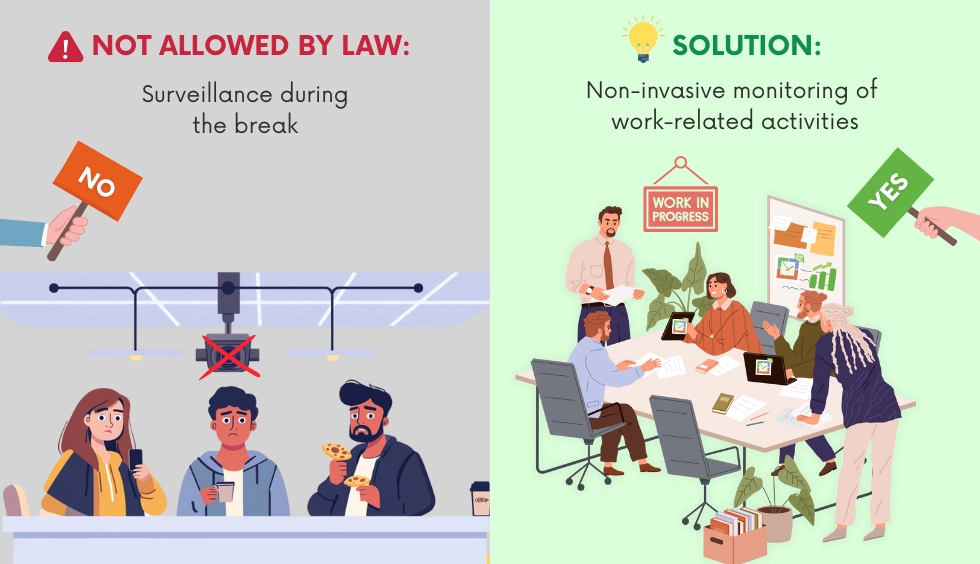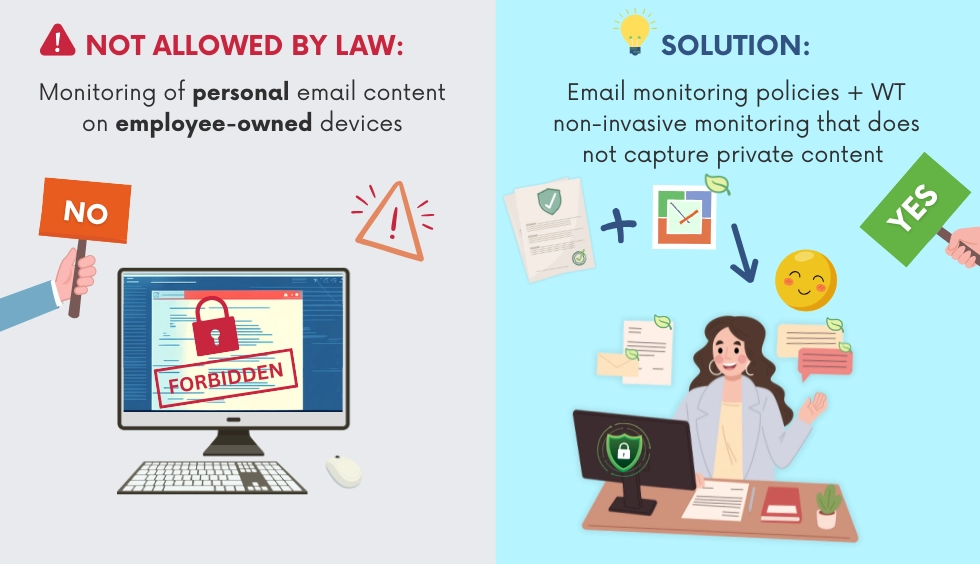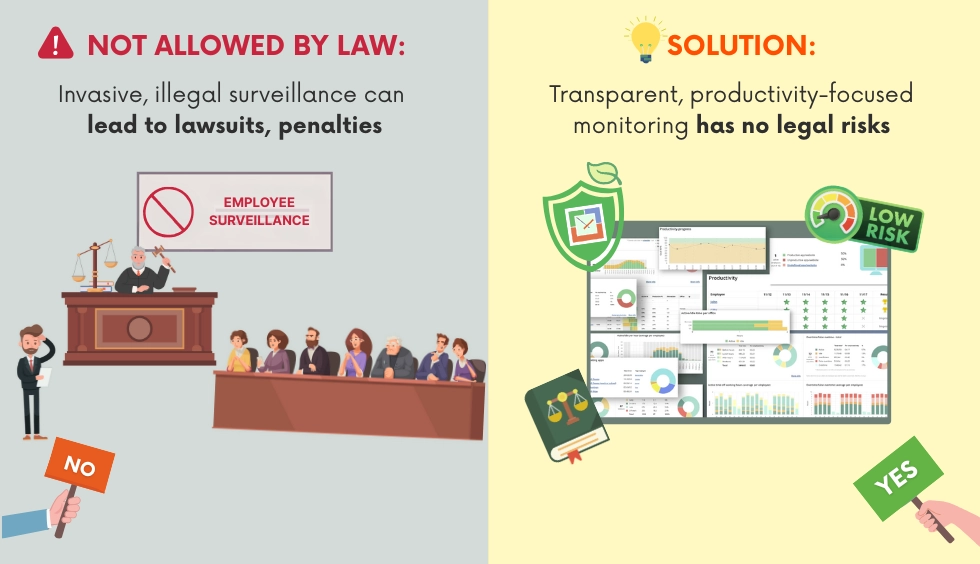This article is provided by WorkTime, a solution designed to boost productivity through respectful, privacy-conscious employee monitoring.
Basics of USA employee monitoring laws
1. Is it legal to monitor employees in the USA?
Yes. Employee monitoring is legal in the U.S. Employee monitoring laws give employers a considerable amount of rights to monitor their employees’ activities on workplace devices. However, it must be justified by valid business reasons. While federal law does not impose a universal disclosure requirement, many state laws require employers to notify employees about electronic monitoring.2. Is it required to inform employees of the monitoring?
No. Under federal laws on employee monitoring, employers have no legal requirements to disclose to their workers that they are being monitored. It is only required under state-specific monitoring laws. Connecticut Gen. Stat. § 31-48d and Delaware Del. 6 Code § 19-7-705 require employers to notify their staff about the use of monitoring software beforehand. So do the comparatively new Texas and New York Data Protection Acts. In other states, it is completely legal for employers to monitor their employees without consent. Moreover, most privacy laws give employers discretion over the extent to which they can use monitoring software. Even if monitoring employees without their knowledge is legal, the choice is yours. Taking a transparent and business-oriented approach is the most effective and safest way to implement monitoring. Announcing employee monitoring is easier when it’s transparent and focused on results. That’s why WorkTime’s non-invasive approach works for teams.3. Informed consent - mandatory or not?
No. Employers are not required to obtain consent to implement monitoring into an employee's workflow. However, four states still require employers to provide notice and obtain consent from employees, including:- Connecticut
- New York
- Texas
- Delaware
4. Monitoring policy - mandatory or not
Yes, the USA employee monitoring policy is a mandatory component for every business. It is recommended that all workplace policies regarding monitoring should:- Be clearly defined and adequately documented.
- Explicitly outline how and what will be monitored.
- Require a written acknowledgment by employees.
- Clarify that there is little or no expectation of privacy when using company property.
- Clearly state that there'll be no gathering of data unrelated to work performance.
- Set restrictions on the disclosure of personal data to third parties.
5. Is it legal to monitor employees during breaks?
No. Employers have the right to monitor the usage of their equipment (computers). Computers can be monitored during business hours as well as before and after hours and breaks. For example, employers may want to ensure employees are not using company-owned computers for inappropriate internet activities. The main idea is that employers can legally monitor computers if they have legitimate business reasons. However, consent may be required for employee monitoring during breaks.
6. When are employers required to notify employees about monitoring in the U.S.?
Some states require advance notice or written disclosure of electronic monitoring. For example, Connecticut, Delaware, and New York mandate that employers inform employees when electronic activity is monitored. Additional notice may also be required when monitoring involves audio recording, video surveillance, personal devices (BYOD), or activity outside working hours.Company’s devices monitoring
7. Is it legal to monitor company’s computers?
Yes. USA employee monitoring laws permit employers to monitor systems they own. According to ECPA, if an employer provides a computer, it is company property, and generally, an employer is allowed to monitor all activities employees carry out on it. This includes (but is not limited to) stored documents, downloads, internet usage, and active/idle time. Additionally, company devices used outside the workplace can be monitored as well.8. Is it legal to monitor company's phones?
Yes. Under U.S. employee monitoring laws, any device provided by an employer is company property. Thus, the employer has the right to monitor it, including internet traffic, screen content, and GPS tracking of employees.9. Is it legal to monitor activity on a company device outside of work hours?
Yes, The employer can implement monitoring outside of work hours but with limitations. For instance, if an employee uses the device for personal correspondence outside of work hours, the employer cannot monitor the device unless this was agreed upon in the employment contract.Personal devices monitoring
10. Is it legal to monitor employees’ personal devices?
Yes. While federal laws on employee monitoring may prohibit employers from monitoring personal devices (laptops, tablets, phones), monitoring is allowed if there are policies, such as Bring Your Own Device (BYOD), permitting the use of personal devices for work-related purposes.11. Is it legal to monitor employees’ personal computers?
Yes. Under certain conditions, an employer can collect data from an employee's computer with a court order or a clearly defined workplace policy that permits monitoring within company premises. As a general rule, employees are protected from unauthorized searches of personal possessions by U.S. employee monitoring laws. The Fourth Amendment, in particular, prohibits unreasonable search and seizure of personal items, which limits the employer's right to monitor employees' personal computers. Please note that the Fourth Amendment only covers the government sector. It does not protect against unreasonable searches and seizures in the private sector.12. Can employers require employees to install monitoring software on personal devices?
No. Employers cannot generally require employees to install monitoring software on personal devices without consent. If it involves personal devices, the employee must agree to it. Besides, monitoring software should comply with employee privacy rights. Employers must ensure transparency and avoid the invasion of personal, non-work-related activities.Screen content monitoring
13. Is it legal to monitor screen contents and keystrokes?
Yes. Under U.S. employee monitoring laws, it is legal for employers to monitor screen captures and keyboard usage on company-owned computers. A good rule of thumb is that anything an employee does on a work device may be accessed by the employer, particularly if there is a clear and documented workplace policy.Phone conversation recording
Still, it’s important to choose safe and non-invasive monitoring methods. One company faced serious consequences due to misuse of screenshot monitoring. Curious about the risks? We’ve covered them all here.14. Is it legal to monitor or record phone conversations?
Yes. There are exceptions when an employee is using a company phone. In addition to the Fourth Amendment, the Electronic Communications Privacy Act (ECPA) of 1986 prohibits the intentional interception of any wire, oral, or electronic communication. However, the law outlines standard exceptions, including:- Service provider exception: The service provider is permitted to access electronic communications.
- Business-related exception: Employers are allowed to monitor the use of company systems for as long as there’s a legitimate business reason behind it.
- Prior-consent exception: Federal laws on employee monitoring allow phone conversation recording with the permission of at least one party (one-party consent law). Each state in the U.S. has its own rules on how many parties need to consent to phone conversation recording.
Email content monitoring
15. Is it legal to monitor email content?
Yes. Most employers in the U.S. have email monitoring policies that give them the right to employee email monitoring. Under U.S. employee monitoring laws, any email an employee sends or receives on a company system (business-related or private emails) is the employer's property and can be accessed or viewed by the company at any time. In some states, consent is important. For example, California and Illinois laws on employee monitoring require employers to obtain consent from third parties before accessing employees' emails. In Connecticut and Delaware, employers must inform employees about email monitoring in the workplace. Additionally, Colorado and Tennessee require companies to establish clear policies regarding employee email monitoring.16. Is it legal to monitor private messages and email content?
Yes. this is legal in a few instances. As stated above, it depends on whether a private email or message was sent or received on the employer's equipment/network. If it was sent on a personal device, employers may monitor it if there are email monitoring policies in place (refer to the section "Is it legal to monitor personal device?"). However, U.S. employee monitoring laws also prohibit employers from monitoring private messages or password-protected personal email accounts without the employee's consent.
Video surveillance in the workplace
17. Is it legal to use video monitoring systems in the workplace?
Yes. U.S. federal laws on employee monitoring allow video surveillance in the workplace, provided there is a legitimate business purpose. However, video monitoring is prohibited in certain areas, such as restrooms, locker rooms, and other spaces where employees have a reasonable expectation of privacy. States such as California, New York, and West Virginia have laws restricting the use of video monitoring systems in restrooms, locker rooms, and certain areas where it is rational to expect privacy. Also, an employer is obliged to notify employees and obtain consent. According to federal wiretap laws in two-party states, video recordings must not include audio.18. Is it legal for an employer to monitor employees through a web camera in a device?
Yes, it's legal for employers to use company-issued devices for surveillance, such as tracking activity or using the webcam. Still, monitoring personal devices in this way is not permitted under U.S. employee monitoring laws.19. Is it legal to monitor employees through a web camera outside of work hours?
No, web camera monitoring outside of work hours may be seen as an invasion of an individual's privacy and personal space. Engaging in such actions could potentially lead to legal disputes.GPS tracking of employees
20. Is it legal to track employee locations using GPS?
Yes. As a rule, employers have the right to track an employee’s geolocation when a company-owned device is being used. For example, if an employee takes a company-provided laptop outside the office, the employer is legally permitted to track its location.21. Is it legal to track a company car using GPS?
Yes, As the vehicle is company property, the employer has the legal basis to track its geolocation, even during off-duty hours. However, employers should inform employees and respect privacy boundaries, especially if the vehicle is used off-duty.22. Is it legal to track an employee's location outside of work hours?
No, tracking an employee's location without prior agreement and a written agreement between the employee and the employer is considered spy tracking and is not allowed. Even with consent, tracking must be transparent, respectful of privacy, business-justified, and comply with applicable laws.Social media monitoring
23. Is it legal to monitor internet and social media activities?
Yes. In most cases, employers have the right to ensure employees use the internet for work-related purposes during paid hours. U.S. laws permit internet activity monitoring, including websites visited, time spent online during working hours, and even restrict access to certain sites. Yes. Social media monitoring is legal if the employer adheres to state laws and regulations. For example, it is legal for employers to carry out pre-employment background checks in certain states before hiring prospective employees. It is also permissible for employers to establish social media policies that restrict employees from indulging during working hours. Additionally, several states have enacted laws that protect employees from employers requiring them to provide a username or password for a social media account.24. Is it legal to monitor internet and social media activity outside of work hours?
No, without the employee's prior consent, such actions are illegal. However, if the employee is using a company device, the employer can implement internet activity monitoring. Any monitoring must be clearly disclosed, limited in scope, and comply with federal and state privacy laws.25. Is it legal for an employer to keep collected data on their employees' Internet activity?
Yes, employers can retain data collected through workplace monitoring. However, workplace monitoring regulations do not permit the use of this information for personal purposes without the employee’s consent. Additionally, they may not disclose the data to third parties unless legally required or explicitly authorized by the employee.Employers’ rights and obligations
26. What are federal laws protecting employees’ privacy in the U.S.?
At the federal level, employers’ right to monitor their employees is protected by the Electronic Communications Privacy Act (ECPA). Since 1986, this Act has provided the fundamental legal background for employee tracking and control practices. Title II, known as the Stored Communications Act (SCA), allows employers to access work-related data created by employees, as long as there’s a valid business reason.Our monitoring experts have developed ready-to-use policies, announcement samples, and monitoring handbooks for direct use or a sample to create the USA employee monitoring policy. Request a copy now. It's free!
27. What are the consequences of violating monitoring laws?
Violating employee monitoring laws in the U.S. can result in serious consequences for employers, including civil lawsuits, regulatory fines, and class actions, especially if monitoring is done without consent or exceeds legal boundaries. Beyond legal and financial risks, such violations can damage a company’s reputation, harm employee trust, and make it harder to attract or retain talent. The best protection is transparency, consent, and compliance with applicable state and federal laws on employee monitoring. Non-invasive monitoring like WorkTime prevents legal risks, as it protects employee privacy.
28. Can employers sue employees using information received from monitoring?
Yes, An employer can sue an employee based on information and evidence obtained through monitoring tools. However, there are important nuances: if the employer violated any laws during the monitoring process, the employee may have grounds for a counterclaim.Employee privacy rights
29. Are there laws in the U.S. that protect employee privacy in the workplace?
Yes. The United States data protection laws of 1998 require employers to safeguard 'sensitive personal information.' In addition, various federal and state laws protect employee privacy. Notable examples include the Video Privacy Protection Act and the California Consumer Privacy Act (CCPA), which grant employees the right to request details about the personal data collected about them. However, employee privacy rights in the workplace are limited. Consequently, workplace policies will rule out certain privacy expectations, especially when it comes to company equipment.30. What US law protects employee privacy?
U.S. employee privacy is protected through federal and state laws - most notably- Electronic Communications Privacy Act (ECPA);
- Stored Communications Act (SCA);
- State-specific laws like the California Consumer Privacy Act (CCPA).
31. Can employees sue employers for violating monitoring laws?
Yes. The employee can sue the employer for violating the state and federal laws on employee monitoring. There could be several reasons for this:- Breach of confidentiality. Publishing any of an employee's personal information publicly available to outsiders is a violation of the employee's privacy.
- Violation of the employee's privacy. Too invasive monitoring can violate a person's personal boundaries, such as intercepting personal messages, wiretapping, keylogging, and more.
U.S. federal legislation on employee monitoring
32. What is the American Data Privacy and Protection Act 2022
The American Data Privacy and Protection Act (ADPPA), H.R. 8152, was introduced in July 2022 as a comprehensive federal data privacy bill. It addresses key areas such as the collection, storage, sharing of personal data, and computer monitoring. The ADPPA aims to limit data collection, stipulating that employee data may only be processed or transferred by employers for valid administrative purposes.33. What is the Wiretap Act?
The Wiretap Act, also known as the Electronic Communications Privacy Act (ECPA), prohibits wiretapping or intercepting calls without the consent of at least one party. Under this law, employers cannot wiretap their employees' phone calls without a valid reason and permission from the law. However, there are exceptions. State authorities may wiretap persons suspected of criminal activity, including employees. Yes, the Electronic Communications Privacy Act also applies to employee email monitoring. Employers must comply with this law when implementing email monitoring in the workplace.34. What is the Computer Fraud and Abuse Act (CFAA)
According to this act, no one has the right to electronically monitor a person's device without a valid reason and permission. The same applies to employers. If the employer does not obtain the employee's permission, he can be brought to court proceedings under the CFAA.35. What is the Stored Communications Act (SCA)?
“This provision is intended to address "computer hackers" and corporate spies.” According to this Act, the employer cannot intentionally intercept and store electronic messages of his employees without their consent. If he does, it will be followed by litigation.Workplace safety
36. Is it legal to use monitoring to prevent harassment and discrimination in the workplace?
Yes, employers can use monitoring to prevent workplace harassment and discrimination. By monitoring employee communication, the employer can identify potential problems and take steps to address them. Still, monitoring employees at work must be legal and accurate.37. Is it legal to use monitoring to detect criminal activity?
Yes, Employers have a right to electronically monitor criminal activity, but they must adhere to certain conditions. For example, one of these conditions may be conducting the monitoring under the supervision of law enforcement agencies. Employers cannot use monitoring to detect criminal activity at their own discretion and without a valid reason.38. Is it legal to use monitoring to track personal relationships between employees?
No, it is not legal for employers to use monitoring solely to track personal relationships between employees. It violates employee privacy rights and creates serious legal and ethical risks.Employee monitoring laws by state
39. Are employers allowed to monitor employees in New York state?
Yes. Employers are allowed to monitor employees’ electronic activities, including telephone conversations, emails, and internet usage in New York State.Video surveillance in the workplace
Due to New York workplace surveillance laws, employers are allowed to install video surveillance in the workplace (private employers are even allowed to do this without notifying employees). However, restrooms, locker rooms, and changing rooms must be avoided, and videos must not include audio.Phone monitoring or recording
New York wiretapping laws prohibit monitoring employee phone calls and eavesdropping on any conversation without the consent of at least one party (one-party consent laws). In New York, employers are allowed to install video surveillance in the workplace (private employers are even allowed to do this without notifying employees). However, restrooms, locker rooms, and changing rooms must be avoided, and videos must not include audio.Passwords/usernames
New York state laws on workplace monitoring prohibit employers from requiring employees to disclose usernames or passwords to their social media accounts. The New York State Privacy Protection and Internet Safety Act determines when and how online personal and private information can be destroyed and establishes responsibilities and enforcement.Workstations/company devices
What are the local legal aspects of employee monitoring? Employers are allowed to monitor workstations and company-owned devices as long as there are legitimate reasons behind the monitoring.40. Are employers allowed to monitor employees in California state?
Yes. According to California laws, employers are permitted to monitor employee workplace activities if they adhere to legal requirements designed to protect employee privacy rights.Video monitoring systems
According to California video surveillance laws, employers are allowed to install video monitoring systems at work but must avoid areas such as restrooms, locker rooms, and changing rooms. However, employers are required to notify their employees of the monitoring due to employee surveillance laws.Email/phone monitoring or recording
California two-party consent laws require employers to notify and get both parties' consent before monitoring or recording conversations.Passwords/medical & web banking details
California state laws on workplace monitoring prevent employers from requesting personal information such as social media usernames, passwords, SSNs, web banking information, and details on a medical condition.Workstations/company devices
Employers are allowed to monitor workstations and company-owned devices as long as there are legitimate reasons behind it.Handbook
Under state laws on workplace monitoring, all employers must create a comprehensive handbook that will include both mandatory and recommended policies. Handbooks must explain in detail what employees are permitted or not allowed to do in the workplace. Employers must update handbooks if employment laws or policies change.41. Are employers allowed to monitor employees in Texas state?
Yes. In Texas, employers have the right to monitor employee activities on company-owned devices. With a clear USA employee monitoring policy, they are free to track employees’ performance during their work hours on company equipment. Still, under the Texas Privacy Protection Act of 2019, they have to inform the employees when and how they are monitoring their activities.Phone calls
Employers have a right to electronically monitor business calls on company-provided phones after obtaining employee consent. Texas is a one-party consent state, so only one person involved in the call needs to be aware of the recording. However, listening in on private conversations is not allowed.Video monitoring
Texas law on video recording in the workplace allows employee surveillance in the workplace, but not in private areas such as restrooms, break rooms, or locker rooms where employees have a reasonable expectation of privacy.Emails and text messages
Employers may access work-related emails stored on company devices. In contrast, password-protected private messages are generally safeguarded from unauthorized access and disclosure under privacy laws.Internet/social media usage
Monitoring employees’ internet and social media activities is allowed on company-owned devices and networks if it serves a legitimate business purpose. Still, employers have to obtain explicit consent if they are monitoring employees’ personal devices or accounts.Workstations/company computers
In Texas, employers have the right to electronically monitor and review data stored on company devices. Nevertheless, they are obligated to safeguard any sensitive personal information belonging to employees and prevent unauthorized access or disclosure.How to stay compliant with U.S. employee monitoring laws?
It is commonly recommended to adopt ethical monitoring practices aligned with legal and business standards. Monitoring should only be conducted when it serves a legitimate organizational purpose. Collected data must be securely stored and protected from unauthorized use. Where employee consent is mandated, employers must provide transparent disclosures, detailing- What is being monitored;
- The purpose and the scope of monitoring;
- What monitoring methods and tools are used.









